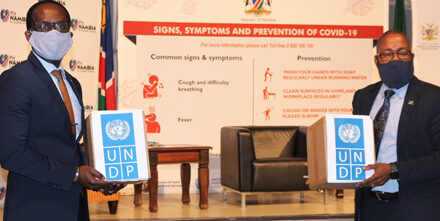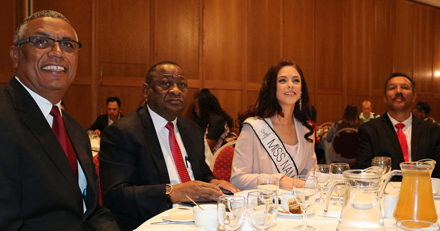
CDC donates multi-media equipment to health ministry to strengthen public health messaging capacity

Through the Centres for Disease Control and Prevention (CDC), the United States government recently donated multi-media equipment to the Ministry of Health and Social Services, which will help the Ministry strengthen its communications by transmitting essential public health messages.
With such a “generous” contribution made through funding from the United States President’s Emergency Plan for AIDS Relief, the Ministry would be able to leverage the reach of the media to ensure that their health messages resonate with people from all walks of life, breaking down barriers and bridging knowledge gaps.
This is according to the Executive Director of the Ministry of Health and Social Services, Ben Nangombe, who expressed thanks on behalf of the government during the handover ceremony.
He said the United States’ unwavering commitment and expertise in public health communication have been critical in getting the country to this juncture.
“The acceptance of this media equipment is not simply a transfer of technology but a promise to use it wisely and responsibly. We accept the responsibility of utilizing these resources to amplify our outreach efforts, engage with our communities, and educate and empower individuals to make informed decisions about their health,” he noted, adding that with this multi-media equipment, the ministry has the power to tell stories that touch hearts, foster understanding, and drive positive behavioural change.
Additionally, Nangombe pointed out that the media has proven its effectiveness in reaching diverse audiences and delivering health messages through partnerships in public education, such as promoting COVID-19 awareness and vaccination uptake, addressing maternal and child health programs, and emphasizing mental health. “These collaborations have demonstrated the power of media in creating relevance and driving positive health outcomes,” he said.
CDC Namibia Country Director, Dr. Brian Baker, stated at the handover ceremony that they are delighted to partner with the Ministry to have the technology needed to develop high-quality media that assist in conveying crucial public health messages.
According to him, the CDC is the United States’ leading science-based, data-driven service organization for public health. “The CDC has a mission to put science into action, including sharing information, credibly, and consistently. By prioritizing the importance of high-quality communication, people get the information they need, they can make choices to better protect their health and wellbeing, and ultimately, lives are saved,” he said.
He also noted that CDC Namibia has supported the Ministry of Health and Social Services for 20 years. Over the years, we have worked together on numerous public health messaging campaigns that have helped improve outcomes in the country on healthcare needs such as HIV/AIDS, COVID-19, hepatitis E, anthrax, and Crimean Congo Hemorrhagic Fever, to name but a few, he added.
He said, however, that during COVID-19, they saw the production and sharing of false information on a scale never seen before.
“Sadly, we witnessed the damaging consequences of this misinformation, where false stories spread like wildfire through communities and across social media platforms. Many of these false messages were packaged in compelling ways which grabbed the attention of the viewer.
“These false messages caused harm, introducing fears that influenced people against taking actions to protect their health. Therefore, not only do public health institutions have a mission and a duty to provide information that is clear and simple to understand, but we also must ensure that the public receives effective and impactful public health messages that are not drowned out by a deluge of false messages. To achieve this, trusted voices, such as the Ministry of Health and Social Services, need the necessary tools. This is why we are here today, to recognize and value the importance of trusted public health messages,” Dr. Baker said.
The CDC Namibia Country Director subsequently, emphasized that developing high-quality communications “in-house” boosts communication speed and decreases costs–factors that are increasingly important as they strive for sustainable healthcare resourcing.













































